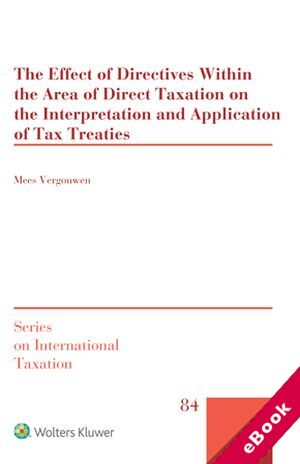
The device(s) you use to access the eBook content must be authorized with an Adobe ID before you download the product otherwise it will fail to register correctly.
For further information see https://www.wildy.com/ebook-formats
Once the order is confirmed an automated e-mail will be sent to you to allow you to download the eBook.
All eBooks are supplied firm sale and cannot be returned. If you believe there is a fault with your eBook then contact us on ebooks@wildy.com and we will help in resolving the issue. This does not affect your statutory rights.
The Effect of Directives Within the Area of Direct Taxation on the Interpretation and Application of Tax Treaties is a first-of-its-kind book that brings a combined public international law and European Union law perspective to bear on certain directives – primarily the Parent-Subsidiary Directive, the Merger Directive, the Interest and Royalty Directive, and the Anti-Tax Avoidance Directives – and their interaction with tax treaties concluded by EU Member States. In this book, the author examines the effect of directives on both the interpretation and application of tax treaties in depth.
What’s in this book:
Shedding light on how directives can affect, or are allowed to affect, tax treaties, the book contains detailed analyses of the following aspects:
The book offers insightful and well-informed recommendations aimed at aligning the ‘allowed’ effect under public international law and the ‘required’ effect under the laws of the EU of the directives on tax treaties, intending to ensure that directives affect tax treaties in such a way that tax treaties cannot prevent the achievement of the result of a directive. Primarily, legal doctrines, literature, and case law of the CJEU, ICJ, and arbitral tribunals form the bases of the analysis resulting in these recommendations.
How this will help you:
As a highly informative and closely reasoned guide that offers clear perspectives on resolving any conflict arising between a directive and a tax treaty, this book will prove to be invaluable for tax practitioners and advisers, judges, policymakers, tax authorities, and academics whose work involves tax treaties concluded by EU Member States.